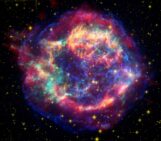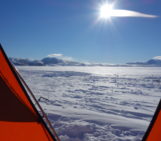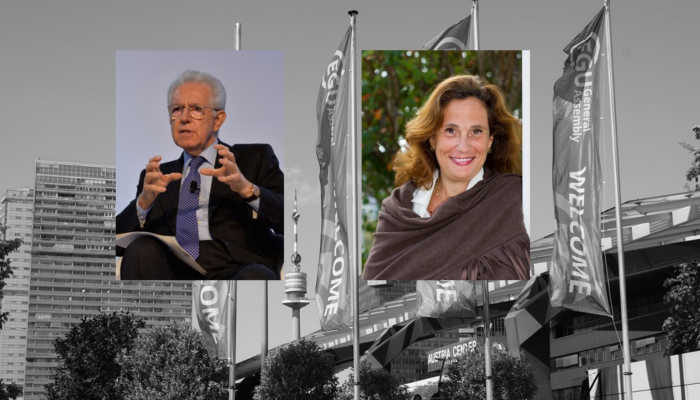
The 2019 EGU General Assembly was a great success. Not only was it the largest in EGU history (with over 16,000 participants, 5,531 oral, 9,432 poster and 1,287 PICO presentations) but it also allowed scientists to connect geoscience and their research with global challenges and potential solutions. One of the highlights of this year’s General Assembly was the high-level session on Science, Politics and European (dis)integration which welcomed two prestigious speakers: Ilaria Capua and Mario Monti.
Ilaria Capua is professor and the director of the One Health Center of Excellence at the University of Florida in the United States. She is a veterinarian by training, a researcher in virology and was a member of the Italian Parliament from 2013 until 2016.
Mario Monti is currently a lifetime member of the Italian Senate and the president of Bocconi University in Milan, Italy. He served as a European Commissioner from 1995 to 2004 and was the Prime Minister of Italy from 2011 to 2013.
From virtuous to vicious circle
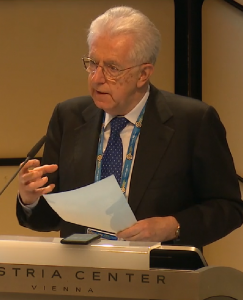
Mario Monti, lifetime member of the Italian Senate and the President of Bocconi University in Milan. Former European Commissioner and Prime Minister of Italy
The session focused on two of the European Union’s greatest threats, populism and fake news, and how these mounting threats could impact both researchers and scientific progress. Mario Monti opened the session by praising the EU’s virtuous circle of economic growth, evidence-based enlightenment, leadership and long-term vision. However, he cautioned that this virtuous circle could be turning into a vicious circle with leadership giving way to political followership, personal interest, rejection of competence, short-termism and fake news.
He warned that a “rise in a mixture of populism, nationalism, sovereignism and protectionism [is having] an impact globally, in the EU and in individual countries” and has the potential to lead to less democracy, more demagogy, and less integration between nations.
The threat of fake news
Ilaria Capua’s very personal presentation told her story and her battle with fake news. After starting her career as a virologist and working in a diverse team on a European project, she was elected as a member of the Italian Parliament. Through this story, Capua highlighted the very real threat of fake news to science, researchers and institutions alike.
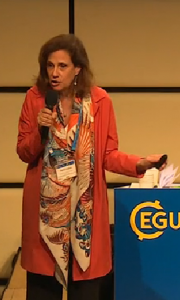
Ilaria Capua, Professor and Director of the One Health Center of Excellence. Former member of the Italian Parliament
“I can tell you that I am very, very concerned of the next threat that is going to become viral. And this threat is the fake news threat for science.”
She warned the scientists in the audience, “Science, scientists and institutions are under attack. Our biggest risk is that our personal and institutional credibility is shaken.” Despite this, she encouraged scientists to still get involved in outreach and share their research with the public because, “…we have challenges that scientists are going to have to answer. They are going to need to talk to policymakers.”
Capua also talked about what she is doing on a personal level to fight fake news and help protect science and institutions, “The real reason I am here is because I have a mission B in life. Mission B is to advocate for you. This is about you. This is about us. I have been a victim of fake news and experienced the violence of slander and despair of reputational loss. I am concerned and afraid that what happened to me can happen to you and can happen to institutions. My mission B is to advocate for scientific integrity and to support scientists when they are accused crimes or misconduct.”
Fighting the rise of populism
Encouraging integration and raising awareness about the threat of rising populism and fake news is vital but one of the first questions raised by the audience was “What can we, as average researchers, do to foster integration?”
“Be yourself and tell surrounding people who you are and how the EU relates to you. And what aspects in your activity would not be there, or not be there so productively, if the EU was not there [or] if the EU was undermined,” Monti responded.
Most arguments for integration are more complex and harder to illustrate than the non-fact-based arguments used by populists to undermine integration. It is therefore “important to promote EU with the positives” whenever possible.
“I would like to see a science pride movement,” stated Capua, focusing on the need to organize. “We need to continue to defend EU research and its values. We need to prepare because attacks will come and we need to develop strategies to maintain our credibility to engage with the public.” She also encouraged scientists to communicate their research more effectively and “find new ways to engage with the public,” highlighting the EGU’s Artist in Residence as one innovative method.
The session made it clear that while fake news and populism might not be something that scientists think about on a daily basis, it is something that can have a severe impact on how research is undertaken. Mario Monti finished his presentation with a warning and a call to action which seems particularly relevant in the lead up to the EU Elections.
“The next victim, I’m afraid, is going to be you. You are the stakeholders of European integration. Don’t forget that the status of the work you do, the multiplier in terms of impact, of application and of global resonance, has a lot to do with the persistence or the going backwards of European integration. So please mobilise!”
EGU’s call for a United Europe
The session culminated with EGU President Alberto Montanari releasing a statement of support for a united Europe. “The EGU firmly believes that threats to a united Europe are threats to scientific research.”
Following the session’s discussion, the EGU statement acknowledges fake news, populism and malicious state actors as key threats to European integration and science. It highlights both the value of research to European “prosperity, wellbeing and global standing” and the need to “work together, pooling complementary skills, expertise and infrastructure, and share data and information within an open and unified environment” to increase the effectiveness of research and meet global challenges.
It concludes by affirming the EGU’s commitment to stand up “for international cooperation in science and taking a leading role within the scientific community in order to reduce barriers to scientific collaboration and cooperation across Europe.”

